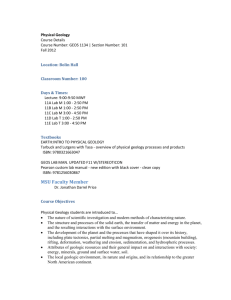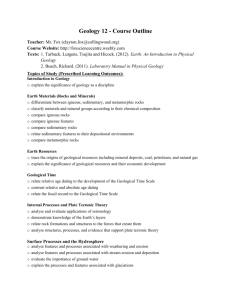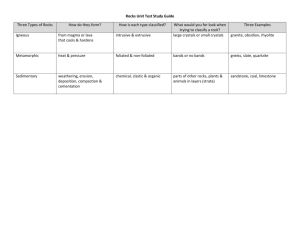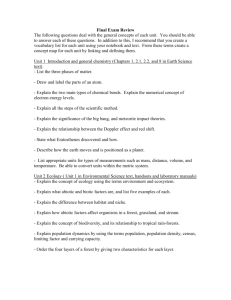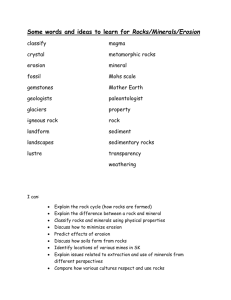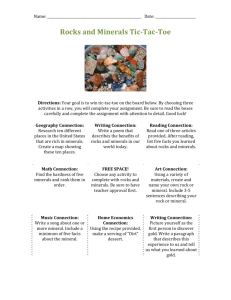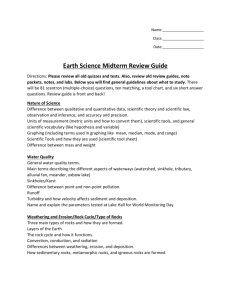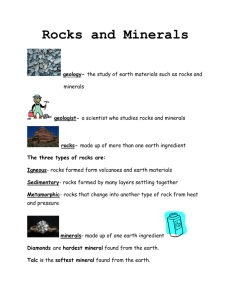Syllabus Spring
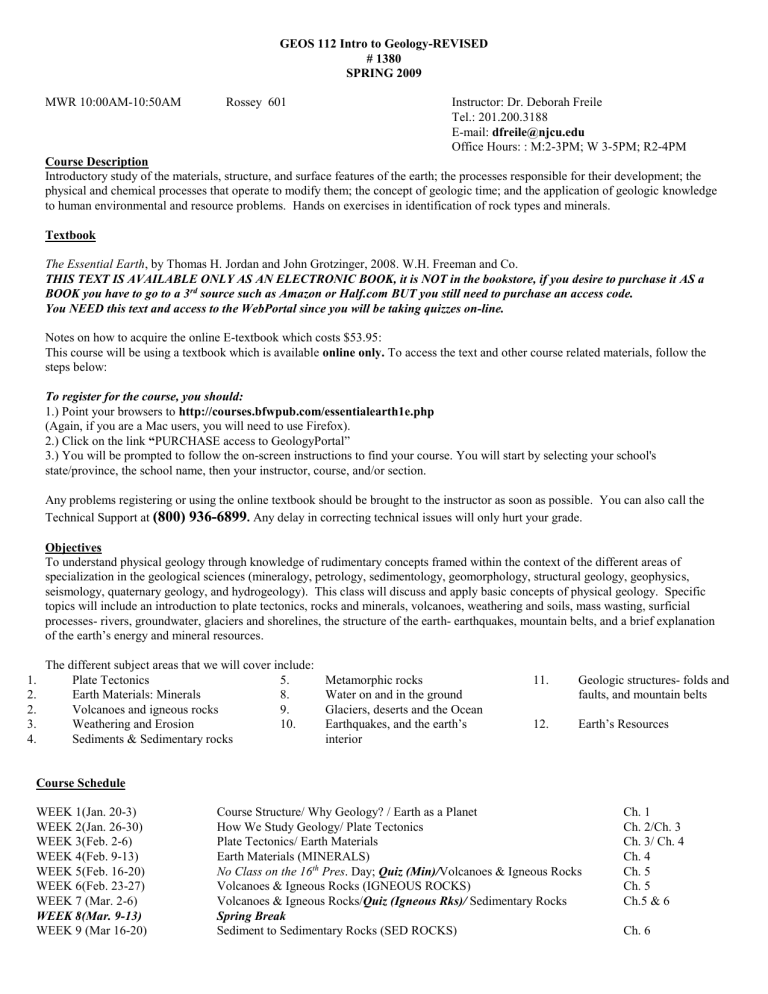
MWR 10:00AM-10:50AM
GEOS 112 Intro to Geology-REVISED
# 1380
SPRING 2009
Rossey 601 Instructor: Dr. Deborah Freile
Tel.: 201.200.3188
E-mail: dfreile@njcu.edu
Office Hours: : M:2-3PM; W 3-5PM; R2-4PM
Course Description
Introductory study of the materials, structure, and surface features of the earth; the processes responsible for their development; the physical and chemical processes that operate to modify them; the concept of geologic time; and the application of geologic knowledge to human environmental and resource problems. Hands on exercises in identification of rock types and minerals.
Textbook
The Essential Earth , by Thomas H. Jordan and John Grotzinger, 2008. W.H. Freeman and Co.
THIS TEXT IS AVAILABLE ONLY AS AN ELECTRONIC BOOK, it is NOT in the bookstore, if you desire to purchase it AS a
BOOK you have to go to a 3 rd source such as Amazon or Half.com BUT you still need to purchase an access code.
You NEED this text and access to the WebPortal since you will be taking quizzes on-line.
Notes on how to acquire the online E-textbook which costs $53.95:
This course will be using a textbook which is available online only.
To access the text and other course related materials, follow the steps below:
To register for the course, you should:
1.) Point your browsers to http://courses.bfwpub.com/essentialearth1e.php
(Again, if you are a Mac users, you will need to use Firefox).
2.) Click on the link “ PURCHASE access to GeologyPortal”
3.) You will be prompted to follow the on-screen instructions to find your course. You will start by selecting your school's state/province, the school name, then your instructor, course, and/or section.
Any problems registering or using the online textbook should be brought to the instructor as soon as possible. You can also call the
Technical Support at
(800) 936-6899
.
Any delay in correcting technical issues will only hurt your grade.
Objectives
To understand physical geology through knowledge of rudimentary concepts framed within the context of the different areas of specialization in the geological sciences (mineralogy, petrology, sedimentology, geomorphology, structural geology, geophysics, seismology, quaternary geology, and hydrogeology). This class will discuss and apply basic concepts of physical geology. Specific
1.
2.
2.
3.
4. topics will include an introduction to plate tectonics, rocks and minerals, volcanoes, weathering and soils, mass wasting, surficial processes- rivers, groundwater, glaciers and shorelines, the structure of the earth- earthquakes, mountain belts, and a brief explanation of the earth’s energy and mineral resources.
The different subject areas that we will cover include:
Plate Tectonics
Earth Materials: Minerals
5.
8.
Metamorphic rocks
Water on and in the ground
11.
Geologic structures- folds and faults, and mountain belts
Volcanoes and igneous rocks
Weathering and Erosion
Sediments & Sedimentary rocks
Course Schedule
9.
10.
Glaciers, deserts and the Ocean
Earthquakes, and the earth’s interior
12. Earth’s Resources
WEEK 1(Jan. 20-3)
WEEK 2(Jan. 26-30)
WEEK 3(Feb. 2-6)
WEEK 4(Feb. 9-13)
WEEK 5(Feb. 16-20)
WEEK 6(Feb. 23-27)
WEEK 7 (Mar. 2-6)
Course Structure/ Why Geology? / Earth as a Planet
How We Study Geology/ Plate Tectonics
Plate Tectonics/ Earth Materials
Earth Materials (MINERALS)
No Class on the 16 th Pres . Day; Quiz (Min)/ Volcanoes & Igneous Rocks
Volcanoes & Igneous Rocks (IGNEOUS ROCKS)
Ch. 1
Ch. 2/Ch. 3
Ch. 3/ Ch. 4
Ch. 4
Ch. 5
Ch. 5
Ch.5 & 6
WEEK 8(Mar. 9-13)
WEEK 9 (Mar 16-20)
Volcanoes & Igneous Rocks/ Quiz (Igneous Rks)/ Sedimentary Rocks
Spring Break
Sediment to Sedimentary Rocks (SED ROCKS) Ch. 6
WEEK 10(Mar. 23-27)
WEEK 11(Mar. 30-Apr. 03)
WEEK 12(Apr. 6-10)
WEEK 13(Apr. 13-17)
WEEK 14(Apr. 20-24)
WEEK 15(Apr. 27-30)
WEEK 16 (May. 4)
May 5
Metamorphism & Deformation (META ROCKS)
MIDTERM/Quiz (Sed& Met Rks)/ Climate and Glaciers
Climate and Glaciers/ GW and Hydrologic Cycle
Rivers
Deserts/ Coastlines
Coastlines / Earthquakes
Human Impact
Final Exam at 8:00-10:00AM
Ch. 7
Ch. 10
Ch. 10 &11
Ch. 12
Ch. 12
Ch. 12/ Ch. 13
Ch. 14
COURSE REQUIREMENTS
Attendance: This course will be run as a BLENDED Course so attendance is up to YOU . The PowerPoint Lectures are up on my webpage at http://faculty.njcu.edu/dfreile and the rest of the information is on the GeoPortal at http://courses.bfwpub.com/essentialearth1e.php
However, some attendance is mandatory, i.e. when we do exercises on minerals and rocks and when we have in-class quizzes on minerals and rocks, so you should look at the syllabus for the weeks in which rocks and minerals will be covered. Attendance will be taken as a measure of you taking your weekly quizzes. If you do not take your weekly quizzes that will impact on your participation in class. Quizzes will ONLY be up on Geoportal for ONE week and only one week, so make time to take the quiz, NO extensions.
Methods of Instruction: This course will employ the following pedagogic techniques:
1.
Lecture and class discussion of material.
2.
Labs on minerals and the 3 types of rocks with Quizzes
3.
Visual instruction in the form of PowerPoint, specific VHS tapes and DVDs. USE your Text and info on the Text’s Website
4.
You may find the PowerPoint slides at http://faculty.njcu.edu/dfreile and look under courses GEOS 112
5.
Applied problem solving skills and analysis.
6.
Testing and assignments ON the publisher’s Website and in class.
Evaluation Components and Grading Scale
Weekly Chapter Tests and Assignments on Publisher’s website
Mineral and Rock Quizzes (3 @10%)
Midterm Exam
45%
30%
10%
Grading Scale
95-100 A
Cumulative Final exam 15%
100%
90-94 A-
87-89 B+
84-86 B
80-83
77-79
B-
C+
74-76
68-73
C
C-
58-67 D
Tests: There will be weekly chapter quizzes and assignments from the publisher’s website that MUST be taken when assigned by instructor . There will be a Mid-term and a Final exam. There is no Make-up exam for the mid term.
The midterm will consist of the following types of questions- multiple choice and true or false and will be ON LINE. The final will consist of the following types of questions- multiple choice, true or false, fill in the blanks, short answer, and diagrams to label. The final will contain extra-credit questions for bonus points. The final, which is mandatory, will be comprehensive and account for 15% of the grade and will be taken IN
CLASS.
Quizzes: There will be 3 practical quizzes dealing with hand sample identification of Minerals, and Igneous Rocks, Sedimentary &
Metamorphic Rocks.
Participation: Class participation is an important part of the learning process. Participation in class is highly encouraged and variations in points of view are welcomed. Attendance to class counts towards class participation, especially when we are engaged in laboratory assignments.
Homework Assignments: There may be several assignments due from the publisher’s webpage during the semester. These assignments are video assignments that must be completed on-time, no extensions.
Expected Outcomes: After completing this course the student is expected to have a solid understanding of the physical earth. Its component parts and the integration of the aforementioned parts into a cohesive whole. The student will be able to explain internal, external and surface earth processes. The student will also have developed skills in identifying rocks and minerals and reading and understanding maps. The students will have made a useful contribution to the success of their understanding of science and scientific principles and their application to the world around them.
Assignments: Students must submit all major assignments on time in order to take the final examinations. Failure to do so will result in failure of the course.
Academic Dishonesty: Students are expected to demonstrate academic integrity at all times. NJCU condemns cheating and plagiarism in any form. Plagiarism is defined as intentionally using the ideas, knowledge, words, and/or visual images of another individual as if those were original to the writer or speaker (INCLUDING THE IMPROPER CITATION OF THOSE WORKS USED); and any other forms of deceit in relation to the student’s affiliation with and commitment to the university. [According to the Student Rights and
Responsibilities: Code of Conduct- Some specific activities that are not to be tolerated on the campus are: (7). Fraud in any for, whether it be altering or changing University records, or cheating in any form. Prohibited activities include (12). Academic dishonesty (a).
Plagiarism, cheating (b). Use of term papers or reports not completely prepared by the student. In this course any student caught cheating on any test or plagiarizing any work will receive an ‘F’ for the entire course.
Withdrawal: Please note that April 15th is the last day to withdraw from a course with a grade of “W
Extra Credit: There will be 1 extra credit opportunity. 20 points can be added to the midterm. The extra credit consists of going to the
American Museum of Natural History in New York City and answering a series of questions. You may find the extra credit assignment at the instructor’s webpage http://faculty.njcu.edu/dfreile and look under courses GEOS 112. It is due 3 weeks before the end of the semester.
Cell Phones and Pagers: Please turn OFF all cell phones and pagers . If a phone rings during class time the student will be asked to leave and counted as absent for that day.
Use of cell phones, IPods, MP3 players or any other electronic device is PROHIBITED during class or EXAMS. Any student using the device will be asked to LEAVE immediately and if taking an exam the exam grade will result in a zero (0).
